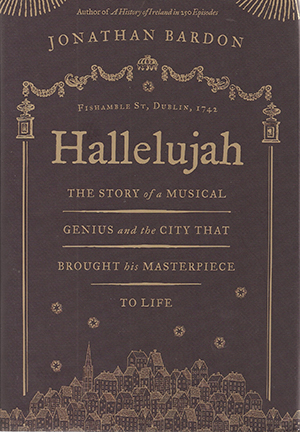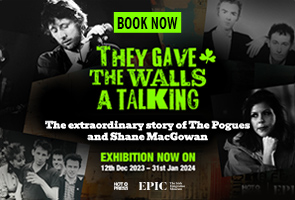Hallelujah: the story of a musical genius and the city that brought his masterpiece to life
Published in Book Reviews, Issue 3 (May/June 2016), Reviews, Volume 24JONATHAN BARDON
Gill & Macmillan
€24.99
ISBN 9780717163540
Reviewed by: David Dickson

Amidst all the enormous amount of literature, past and present, devoted to the composer Handel and his works, his extended stay in Dublin in 1741/2 has received modest enough attention, and it is usually treated as a slightly quixotic incident in his long life as court musician in Hanoverian London. Irish contributions to that literature may have suggested otherwise, but they are modest and have been restricted by frustrating gaps in the evidence: who actually invited Handel to Dublin? In composing the score of the Messiah in a mere 24 days in London, did he do this knowing that the oratorio had to be ready for a Dublin audience? And why was it that from the time of its first tumultuous performance in Fishamble Street in April 1742 it was a success with Irish audiences, when its subsequent popularity in London had to be so hard won?
Jonathan Bardon, well known to readers of History Ireland, has a reputation for producing lively, highly accessible, balanced general histories on a variety of regional and national themes, mixing clear prose with a painterly eye for telling detail. But this is something different: it is still popular history but on a very specific topic, with its intended readership including those unfamiliar with all the oddities of eighteenth-century Ireland. It slowly builds up to the climactic event—the first performance of the Messiah—and in so doing explores a remarkable variety of contexts, personal and political, topographical and environmental, German and Italian, British and Irish. But familiar dramatis personae loom large, notably the less-than-charismatic viceroy, the duke of Devonshire, Mrs Delany and her earnest husband, Edward Jennens the librettist (a non-juror but not a Jacobite), the Dublin poet Laurence Whyte and of course Jonathan Swift, plus the great, the good and the disgraced of the contemporary London stage. And by Chapter 10 we encounter the sheer excitement, perhaps even the ecstasy, experienced by the first audience of 700 who packed into Neal’s recently constructed Music Hall.
The result is an immensely satisfying account of the making of the first Messiah. The intense evangelical motivation and literary skills of the eccentric librettist are ably demonstrated, whereas Handel’s inner world remains a little more elusive: a celebrity in London for 30 years and architect of the English oratorio, in the small world of Dublin he found instant acceptance from the duke of Devonshire downwards, helped by a winning manner, a reputation as bon viveur and raconteur, and as someone warmly appreciative of Irish success (social and financial) when his stock had been falling in London. Yet Bardon is careful to recognise that Handel’s Dublin success came at an opportune moment, a time when the city was buffeted by war, famine and a sense of political enfeeblement, and where upper-class involvement in local philanthropy was never stronger. And it was a time when musical performance as public entertainment was developing for the first time, most strikingly in the form of charity concerts in the principal Anglican churches.
Thus Handel’s repertoire, part secular, part sacred, provided diversion, spectacle and a means for depleted charities to recover their finances. The association between charity and spectacular musical events was never stronger than in the case of the Messiah, and this helped ensure both its immediate success and its enduring popularity in the city. Yet such an association was only established in London when Handel became involved with the Foundling Hospital and presented the Messiah there in May 1750—an event that was recreated on BBC2 in 2014, when publicists were happy to claim that ‘without the [London] Foundling Hospital, Messiah would have been silenced’ (The Guardian, 13 March 2014). As Bardon so ably shows, that is nonsense: its popularity in Ireland was already assured, and there were a number of revivals in Dublin and Cork during the 1740s. He speculates that the socially less exclusive character of Dublin theatre and concert audiences compared to those in London may have contributed to its Irish success, echoing arguments made long ago by Brian Boydell as to what made eighteenth-century Dublin musical taste distinctive.
Some of the perennial questions about the first Messiah still remain (notably how Swift’s refusal to allow his choristers to be involved was circumvented). But in marshalling so much indirect evidence and providing such a clear account of what is known, Bardon has brilliantly contextualised the first performance of what must remain the most popular piece of western choral music.
David Dickson is Professor of Modern History at Trinity College, Dublin.
















